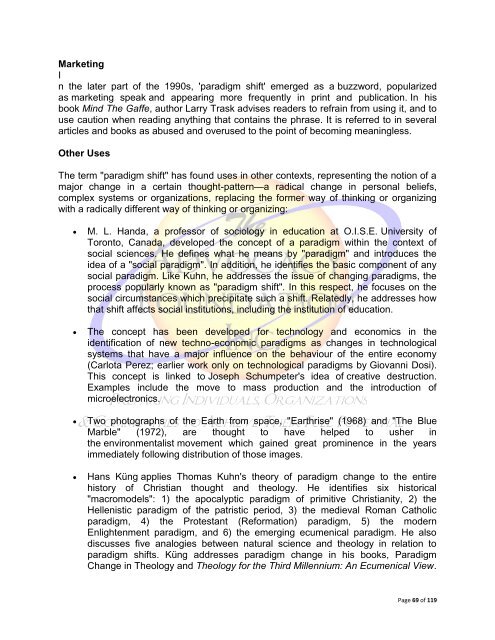International Legal Evangelism: Intelligence, Reconnaissance & Missions
International Legal Evangelism: Intelligence, Reconnaissance & Missions
International Legal Evangelism: Intelligence, Reconnaissance & Missions
Create successful ePaper yourself
Turn your PDF publications into a flip-book with our unique Google optimized e-Paper software.
Marketing<br />
I<br />
n the later part of the 1990s, 'paradigm shift' emerged as a buzzword, popularized<br />
as marketing speak and appearing more frequently in print and publication. In his<br />
book Mind The Gaffe, author Larry Trask advises readers to refrain from using it, and to<br />
use caution when reading anything that contains the phrase. It is referred to in several<br />
articles and books as abused and overused to the point of becoming meaningless.<br />
Other Uses<br />
The term "paradigm shift" has found uses in other contexts, representing the notion of a<br />
major change in a certain thought-pattern—a radical change in personal beliefs,<br />
complex systems or organizations, replacing the former way of thinking or organizing<br />
with a radically different way of thinking or organizing:<br />
<br />
<br />
<br />
<br />
M. L. Handa, a professor of sociology in education at O.I.S.E. University of<br />
Toronto, Canada, developed the concept of a paradigm within the context of<br />
social sciences. He defines what he means by "paradigm" and introduces the<br />
idea of a "social paradigm". In addition, he identifies the basic component of any<br />
social paradigm. Like Kuhn, he addresses the issue of changing paradigms, the<br />
process popularly known as "paradigm shift". In this respect, he focuses on the<br />
social circumstances which precipitate such a shift. Relatedly, he addresses how<br />
that shift affects social institutions, including the institution of education.<br />
The concept has been developed for technology and economics in the<br />
identification of new techno-economic paradigms as changes in technological<br />
systems that have a major influence on the behaviour of the entire economy<br />
(Carlota Perez; earlier work only on technological paradigms by Giovanni Dosi).<br />
This concept is linked to Joseph Schumpeter's idea of creative destruction.<br />
Examples include the move to mass production and the introduction of<br />
microelectronics.<br />
Two photographs of the Earth from space, "Earthrise" (1968) and "The Blue<br />
Marble" (1972), are thought to have helped to usher in<br />
the environmentalist movement which gained great prominence in the years<br />
immediately following distribution of those images.<br />
Hans Küng applies Thomas Kuhn's theory of paradigm change to the entire<br />
history of Christian thought and theology. He identifies six historical<br />
"macromodels": 1) the apocalyptic paradigm of primitive Christianity, 2) the<br />
Hellenistic paradigm of the patristic period, 3) the medieval Roman Catholic<br />
paradigm, 4) the Protestant (Reformation) paradigm, 5) the modern<br />
Enlightenment paradigm, and 6) the emerging ecumenical paradigm. He also<br />
discusses five analogies between natural science and theology in relation to<br />
paradigm shifts. Küng addresses paradigm change in his books, Paradigm<br />
Change in Theology and Theology for the Third Millennium: An Ecumenical View.<br />
Page 69 of 119

















